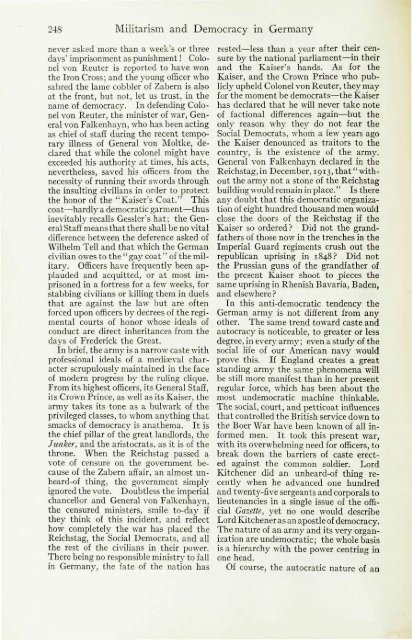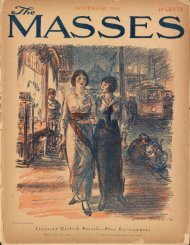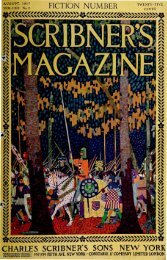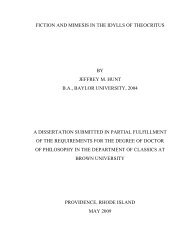View PDF - Brown Library
View PDF - Brown Library
View PDF - Brown Library
Create successful ePaper yourself
Turn your PDF publications into a flip-book with our unique Google optimized e-Paper software.
248 Militarism and Democracy in Germany<br />
never asked more than a week's or three<br />
days' imprisonment as punishment! Colonel<br />
von Reuter is reported to have won<br />
the Iron Cross; and the young officer who<br />
sabred the lame cobbler of Zabern is also<br />
at the front, but not, let us trust, in the<br />
name of democracy. In defending Colonel<br />
von Reuter, the minister of war, General<br />
von Falkenhayn, who has been acting<br />
as chief of staff during the recent temporary<br />
illness of General von Moltke, declared<br />
that while the colonel might have<br />
exceeded his authority at times, his acts,<br />
nevertheless, saved his officers from the<br />
necessity of running their swords through<br />
the insulting civilians in order to protect<br />
the honor of the "Kaiser's Coat." This<br />
coat—hardly a democratic garment—thus<br />
inevitably recalls Gessler's hat; the General<br />
Staff means that there shall be no vital<br />
difference between the deference asked of<br />
Wilhelm Tell and that which the German<br />
civilian owes to the "gay coat" of the military.<br />
Officers have frequently been applauded<br />
and acquitted, or at most imprisoned<br />
in a fortress for a few weeks, for<br />
stabbing civilians or killing them in duels<br />
that are against the law but are often<br />
forced upon officers by decrees of the regimental<br />
courts of honor whose ideals of<br />
conduct are direct inheritances from the<br />
days of Frederick the Great.<br />
In brief, the army is a narrow caste with<br />
professional ideals of a mediaeval character<br />
scrupulously maintained in the face<br />
of modern progress by the ruling clique.<br />
From its highest officers, its General Staff,<br />
its Crown Prince, as well as its Kaiser, the<br />
army takes its tone as a bulwark of the<br />
privileged classes, to whom anything that<br />
smacks of democracy is anathema. It is<br />
the chief pillar of the great landlords, the<br />
Junker, and the aristocrats, as it is of the<br />
throne. When the Reichstag passed a<br />
vote of censure on the government because<br />
of the Zabern affair, an almost unheard-of<br />
thing, the government simply<br />
ignored the vote. Doubtless the imperial<br />
chancellor and General von Falkenhayn,<br />
the censured ministers, smile to-day if<br />
they think of this incident, and reflect<br />
how completely the war has placed the<br />
Reichstag, the Social Democrats, and all<br />
the rest of the civilians in their power.<br />
There being no responsible ministry to fall<br />
in Germany, the fate of the nation has<br />
rested—less than a year after their censure<br />
by the national parliament—in their<br />
and the Kaiser's hands. As for the<br />
Kaiser, and the Crown Prince who publicly<br />
upheld Colonel von Reuter, they may<br />
for the moment be democrats—the Kaiser<br />
has declared that he will never take note<br />
of factional differences again—but the<br />
only reason why they do not fear the<br />
Social Democrats, whom a few years ago<br />
the Kaiser denounced as traitors to the<br />
country, is the existence of the army.<br />
General von Falkenhayn declared in the<br />
Reichstag, in December, 1913, that "without<br />
the army not a stone of the Reichstag<br />
building would remain in place." Is there<br />
any doubt that this democratic organization<br />
of eight hundred thousand men would<br />
close the doors of the Reichstag if the<br />
Kaiser so ordered? Did not the grandfathers<br />
of those now in the trenches in the<br />
Imperial Guard regiments crush out the<br />
republican uprising in 1848? Did not<br />
the Prussian guns of the grandfather of<br />
the present Kaiser shoot to pieces the<br />
same uprising in Rhenish Bavaria, Baden,<br />
and elsewhere ?<br />
In this anti-democratic tendency the<br />
German army is not different from any<br />
other. The same trend toward caste and<br />
autocracy is noticeable, to greater or less<br />
degree, in every army; even a study of the<br />
social life of our American navy would<br />
prove this. If England creates a great<br />
standing army the same phenomena will<br />
be still more manifest than in her present<br />
regular force, which has been about the<br />
most undemocratic machine thinkable.<br />
The social, court, and petticoat influences<br />
that controlled the British service down to<br />
the Boer War have been known of all informed<br />
men. It took this present war,<br />
with its overwhelming need for officers, to<br />
break down the barriers of caste erected<br />
against the common soldier. Lord<br />
Kitchener did an unheard-of thing recently<br />
when he advanced one hundred<br />
and twenty-five sergeants and corporals to<br />
lieutenancies in a single issue of the official<br />
Gazette, yet no one would describe<br />
Lord Kitchener as an apostle of democracy.<br />
The nature of an army and its very organization<br />
are undemocratic; the whole basis<br />
is a hierarchy with the power centring in<br />
one head.<br />
Of course, the autocratic nature of an










